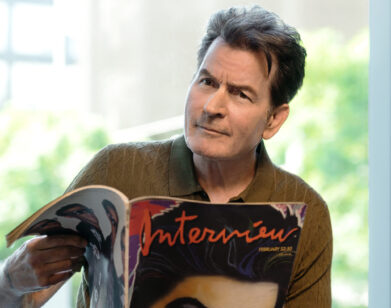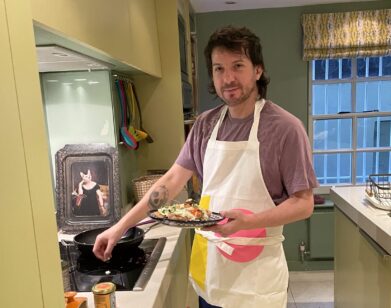rough draft
How Psychic Vampires and Silence of the Lambs Inspired Caroline Kepnes’s You Series

Caroline Kepnes at her “desk.”
This is Rough Draft, in which our favorite writers get to the bottom of their own craft. From preferred writing drinks to whether or not you really need to carry a notebook, we find out all the ways they beat writer’s block and do the work. Before curling up with You Love Me—the latest installment in the You series, which inspired Netflix’s TV show of the same name—by Caroline Kepnes, discover all the elements that helped her get it done.
———
JULIANA UKIOMOGBE: Describe your ideal writing atmosphere.
CAROLINE KEPNES: The new ideal: It’s 6 in the morning and I wake up with an idea. The night before, I went to bed worried about the book, and now I play it out in my head and go into my computer and suddenly it’s 10:30 in the morning, not even noon yet! Then, I take a break and set myself up on the sofa for round two. Writing gets me in the mood to write. It’s a compulsion. And I love repetition, so I will listen to a song on repeat to get fired up. Also, I miss coffee shops. The energy of being around other people is invigorating, the stimulation of a human face. This is probably why a cardboard Danny DeVito is standing next to my TV, across from my sofa.
UKIOMOGBE: Do you eat or drink while you write?
KEPNES: I have an Invisalign cage on my teeth so I can’t sip an iced latte while I pick apart a hot blackened chicken sandwich and finish it when it’s cold. But one day I’ll be back!
UKIOMOGBE: Do you ever smoke or drink while you write? How do you think they impact your writing?
KEPNES: Vodka-writing isn’t for me. It’s like drunk-texting. It’s a nightmare. But every so often, I wake up with a nasty, head-splitting hangover and my instincts are sharp and it’s like, ‘Oh great, I can’t sit here and watch TV and groan like a normal person. I have to fucking write.’
UKIOMOGBE: Do you keep a notebook and/or journal?
KEPNES: I was militant with my diary in my youth and I started recording my misspelled thoughts when I was six. I have terrible handwriting, so now I tend to make notes on my phone.
UKIOMOGBE: What’s your favorite quote?
KEPNES: Today I’m gonna go with something that my friend and fellow writer Deb Shapiro reminded me of recently: “Fuck everybody except Linda.” It’s from Desperate Characters. Simple, selfish, devoted graffiti on a wall. I interviewed Parker Posey for my college arts magazine, and after a two-hour conversation, she said that if I asked her all the same questions a day later, all her answers would all be different. I think of her disclaimer every time I see the word “favorite.”
UKIOMOGBE: Whose writing do you always return to?
KEPNES: I like to be bowled over by Elizabeth Strout and Stephen King. I revisit things that made me laugh— Jincey Willett’s grocery store hurricane frenzy in Winner of the National Book Award—and things that made me shake, Alice Sebold’s The Lovely Bones and Michael Cunningham’s Flesh and Blood and Ann Petry’s The Street.
UKIOMOGBE: What books did you read as a kid? Have your thoughts about the writers changed?
KEPNES: I keep Charlotte & Charles on my coffee table, the story of a couple on an island. They have opposing views on human nature and happiness. He wants it to be the two of them, alone, and she yearns for a community. That book captivated me and stressed me out so much! Opposites attract, yes, but then what? I don’t know what I would have done without Are You There, God? It’s Me, Margaret. I was terrified by the sanitary belts. I think that it’s been updated—pads instead of belts—but I liked identifying so strongly with Margaret, and feeling, simultaneously, secretly terrified by those mysterious belts.
UKIOMOGBE: Do you read while you’re in the process of writing? Which writers inform your current work the most?
KEPNES: You know the part of Thomas Harris’s Silence of the Lambs when we learn that Lecter manipulated Miggs into committing suicide? That was largely on my mind when I started You Love Me. I went in hot on Dave Cullen’s Columbine, Debbie Macomber’s Cedar Cove, and Patricia Highsmith’s This Sweet Sickness. The blind eyes and social contracts that form a community, plus the dark relentless malignancy of one man’s secret obsession. It’s been eight years with my narrator Joe Goldberg, and I’m still responding to Barbara E. Hort’s book on psychic vampires. And Prince. I do the most reading—cherishing Alma Katsu and Jesmyn Ward—before I go into obsessive writing mode.
UKIOMOGBE: How many drafts of one piece do you typically write?
KEPNES: I rewrite as I go along, as if my first draft is the final draft. Eventually, I send it off, high on excitement. And then I collapse and have anxiety nightmares where my evil brain attacks me with pages of my own writing, some accurate, some not. Rewriting is my favorite part of writing. I will do 2-4 drafts of a book, plus some targeted surgery.
UKIOMOGBE: What would the title of your memoir be?
KEPNES: This question brings me home to Cape Cod, where I grew up. I remember seeing Nancy Kerrigan scream, “Why me?” I was fascinated by the spectrum of the response and I remember thinking that Tonya Harding was probably like, “Yeah, honey, that’s my point! Why you?”
UKIOMOGBE: Who’s your favorite screenwriter? Can a movie ever be as good as the book?
KEPNES: The control freak in me prefers writing fiction because I enjoy the freedom—you can go anywhere—and the finality—the words are the end. This is probably why books are the source of so many movies. I think of the Coen Brothers, the dialogue in Raising Arizona and Fargo, and the fact that upon finishing those screenplays, they gathered hundreds of people to make the movies. I also love Nora Ephron, Cameron Crowe, and Quentin Tarantino. I will do a rom-com or a big softie with a Death Proof chaser. I love a Big Chill, a lot of talking, manipulation, and communication. Ooh, and Greenberg—that’s a movie that made me want to write a book.
UKIOMOGBE: Do you consider writing to be a spiritual practice?
KEPNES: You are using your imagination to build a world. That requires a leap of faith, dedication, and willpower. Every time I sit down to write, I am gunning for that moment when I’ve crossed over into another atmosphere. That fleeting exhilaration is not about the end game, and it doesn’t mean that the words of the day will be the words in the book, but it’s uplifting and fulfilling.
UKIOMOGBE: Which writers would you choose to have dinner with, living or dead?
KEPNES: I have been on my sofa alone a lot lately, so I am dying to reunite at a round table with writer friends I’ve known for years, and meet the writers I know online in person, over drinks for a feast of scents and nachos and mannerisms.
UKIOMOGBE: What advice do you have for people who want to be better writers?
KEPNES: Get to know yourself, what helps you, what hinders you. I do better when I lighten up and approach a session with my laptop as an opportunity to fail and grow. Get used to mood swings. It means you’re trying to do better. I am a little morbid, so I also like to think, Hey, I’ll be dead one day, maybe even tomorrow! Never mind me, what about this book? You have to keep yourself intrigued and interested if you’re going to get to the end.
UKIOMOGBE: What are some unconventional techniques you stand by?
KEPNES: With the You books, I use a narrator who can be a bit more tell than show. I don’t think I’ve ever mentioned cicadas or tarpaulin, two words I’ve noticed in many books I’ve loved over the years. I love exclamation points!
UKIOMOGBE: Can great writing save the world?
KEPNES: I think it’s important that we know how to say the words “I don’t know.” Reading any great book is overwhelming in the best way. I love to marvel. How did she do that? Why is this so funny? What is it about this passage that will haunt me? Great writing is a gift, it’s someone’s voice, their senses of humor and harm, attention to nuance, the result of both their spontaneous mind and work ethic. It’s like Richard Scarry’s What Do People Do All Day? I’m happy that people still choose to write books and take us inside all the different hearts and minds.






